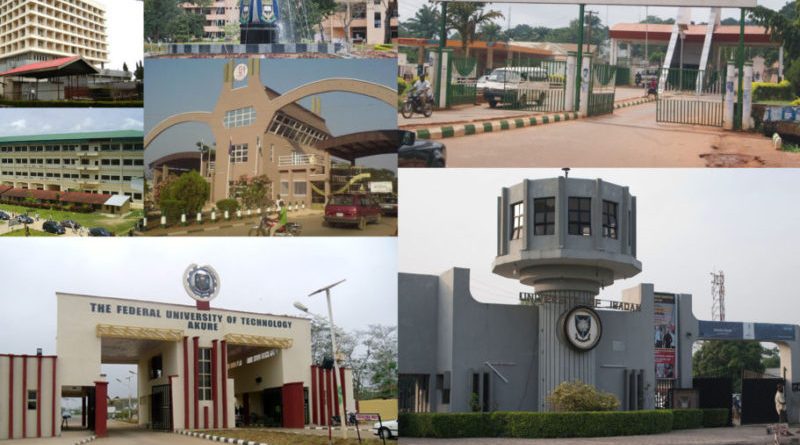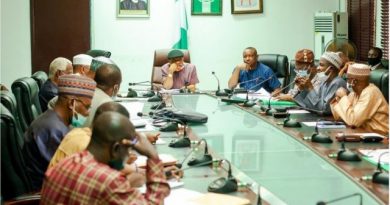Nigerian Universities’ Trade Unionism: The Reality Of Modern Time: (Thinking Out Of Box)
Tunde Akinlade
Trade Union activities in the private sector is far widely different from the public sector, no doubt.
In the private sector, unions function through the provisions of labour laws, trade dispute laws and other extant labour related enactments, rules and regulations.
Whereas in the public sector, it is more of emotions and sentiments cum jettisoning of relevant laws and subject the system to arbitrariness and rule of man. This is essentially common in union management in our universities.
In fact, many “accidental” union leaders in our ivory towers do often misinterpret the autonomous status granted our universities, equating it to absolute sovereignty in itself.
Our public universities are under the public service as created by law. They are all subjected to the rules of the public service under the headship of the Head of Service of the Federation or of the State as the case may be. No Vice Chancellor is above the Head of Service be it at the Federal or State level. All trade unions are therefore under the provisions of our labour related laws irrespective of our conditions of service. That made them answerable to the Registrar of Trade Unions who is a Director in the Federal Ministry of Labour and Productivity. With this, it should be made clear to all that the Registrar of Trade Unions have the power to register or deregister any trade union in Nigeria if the need arise.
STRIKE AND LOCKOUT:
Locking out of workers by employers and strike actions by employees are two sides of a coin. A side face the employer where the employer locked out his employees. In that case, the employer must pay his workers during the period of the lockout.
While the employees also lost their rights to salary payment during the period they wilfully withdrew their services from duty when the other side face them. There is no labour leader around the world that can genuinely claim ignorant of this rule.
This also have wide acceptance by the international labour bodies.
If in Nigeria, the government as the largest employer of labour has not been implementing the rule, that does not expunge it from the “cultural book” of our trade unionism. It is there but made to be dormant. It can be active again at any time the situation demands. It is absolutely wrong and illegal for any union to commence negotiation and still remain on strike. What we have seen in our universities in the last 5 months is an aberration and a dastard act of disobedience to the rule of law. There is nowhere where a union will declare a warning strike of one month at a stretch, embark on full blown strike for six months and without calling off the strike yet be demanding for salary for the work not done. It can only happen in Nigerian public universities where professorial status is absolute and considered to be above the law.
THE PRINCIPLE OF COLLECTIVE BARGAINING:
The power of bargaining in Nigeria is not hinged on how swift one can be on the bargaining table or how crafty one is or how loud the banging of the table at negotiations is, alone can guarantee success. Success at negotiation carries with it the consideration of some indices which include among others economic, social, cultural and legal realities. Maneuvering through them with empirical data and pragmatic display of knowledge of them when and where necessary guarantees the much desired success.
In an effective and enforceable collective bargaining, the role of the Federal Minister of Labour is key. This is not limited to public service. See Trade Dispute Act 2004 (as amended).
Many of our labour leaders are mere activists without proper training in collective bargaining and industrial relations. That is why their agreements with the government are seldom fully implemented or implemented haphazardly
because many of these agreements are unenforceable.
Collective bargaining has gone beyond table banging of yesteryears. It is now an art fully ladened with science and technology that can only be displayed by someone well trained and groomed in labour unionism.
An example of lack of knowledge in collective bargaining is where our leaders are comparing a Senator or Chief Justice of the Federation’s earnings with that of a professor.
The argument to us is sensible but to the government side, it is more of emotion and is unrealistic.
What is the job description of a professor and that of the CJN?
How many professors do we have and how many CJN do we have in the federal government service. Case of comparative advantage in favour of the CJN.
Is it part of the functions of the professor to carry out oversight functions and also execute constituency projects like the Senators?
Why then are we negotiating beyond and outside our job description? A good case has been reduced to a mere sentiment.
A secondary school teacher on grade level 17 and a Director in the Ministry on the same grade level are earning the same salary but they are not commanding equal social respect. The Director is more respected than the teacher. That is the social value attached to one’s job against the other. Mass production of professors over time has reduced the prestige so attached. Much of the respect accosting that status are largely restricted to the university environments and fewer religion centres nowadays. Real professors must be ready to prove their mettle internationally and won for themselves the Emeritus status in their home universities.
In economics class, is it advisable for the government to push out 100billion naira as salary arrears and emoluments of a sector into the economy at once without contending with inflation?
If not, no government will agree to push such a humongous amount into the economy and create uncontrollable inflation.
Since the Udoji Award of 1972, Nigerian government has never done such again because of the spontaneous galloping inflation that attended to the award.
Another error we are making is comparing what a professor in America is earning with ours and using that to negotiate.
Two factors are working against that reasoning.
First, the economy of America and Nigeria are not the same. If a professor earns 10000:00 dollars per month in America, that professor is not a millionaire within that economy.
In Nigeria, if another professor is being paid an equivalent of that salary, he becomes a multimillion in a month. Can our economy sustain that?
Secondly, sighting foreign examples does not have the force of law in Nigeria. They are for persuasion purpose alone. Our local economy should be the bases for our negotiations. Staff welfare goes beyond salary alone. There are other things like car and furniture loans. Housing loan and other sundry negotiable fringe benefits that could be added to improve the general welfare of staffers.
Stealing and corruption in our economy is not sufficient a reason and can’t be used as a yardstick in negotiations. The culprits are criminals and shall be treated as one if caught. No nation will encourage incidence of criminality to be used as a yardstick to measure the solvency of its economy.
University labour leaders ought to concentrate more efforts on what I termed as baseline and differential salary structures.
The baseline line salary structure is what is also called benchmark salary or minimum wage for the universities. This can be fixed by the Body of Pro-Chancellors, NUC and the university based unions at the national level.
Differential salary will be the affordable allowances payable by each university depending on its ability to generate enough internal revenue to finance it.
In essence, a Professor or Deputy Registrar in University A may earn more than that of B due to the availability of fund based on productivity and solvency.
Each university should be made to generate revenue for its growth while staffers should be encouraged to be more productive and result oriented.
How many foreign students do we have in our universities even at postgraduate levels? Attach reward to bringing of foreign students and provide enabling environment for that reward system to thrive.
Let grants attraction be part of the yardstick for promotion to the position of professor and see how our universities will be flooded with money.
A Call for a Holistic Reform
A holistic reform of our universities will put an end to the absurdities on ground. The major problem confronting our institutions is funding. Efforts of government through direct intervention in the Federal universities worth noting. In fact, through TetFund and Needs Assessment Fund, it can be rightly put that all public universities are now federally owned.
State university owners have abdicated their responsibilities on physical development of their institutions. After the initial structures, the rest is left for TetFund. That is why it is easy for a State to have up to three different universities.
Federal government is also caught in this web. Proliferation of federal universities on political consideration alone is over-tasking TefFund.
At this juncture, the situation shouldn’t be about ASUU, NASU, NAAT or SSANU.
Universities are to be solution providers and not problem givers.
The role of the Governing Councils in our universities needed a review.
We can’t be running our universities the same way we are running our local government councils.
We need not to be waiting on government for monthly allocation/subvention to run our universities.
Funding universities should not be from one source only.
In fact, it should be an aggregate funding with the government being a part.
We need no IPPIS if we are doing things rightly.
We have ivy league schools in America. What made them that and excluded others.
In the defunct Western Region, we have AIONIAN group of schools. The Almighty Comprehensive High School, Ayetoro didn’t make the membership of it. Not even Loyola College, Ibadan. Mayflower School, Ikenne and Ogbomoso Grammar School, Ogbomoso are not members.
What made these secondary schools AIONIAN Brothers? They are still in existence. Egbado College, Ilaro, Abeokuta Grammar School, Abeokuta, Ijebu-Ode Grammar School, Ijebu-Ode, Ibadan Grammar School, Ilesa Grammar School, Manuwa College and many first grade secondary schools of that era are members and still hold their membership till date.
They are collaborators in many fields at that level. They engage in Art, Science and Sports.
What is wrong in some group of universities, coming together, develop a blueprint for the development of a modern university curriculum for their schools thereby creating a better understanding in university management?
University of London is not waiting for Oxford or Cambridge to pay its workers so they don’t necessarily need to have a centrally strong trade unions to demand for better conditions of service.
Universities should be run as an entity capable of fixing its own differential salary structure outside the baseline one fixed by the central government.
There must be competitiveness in our universities in terms of productivity and reward determination system.
It is only an excelling university that can attract grants, foreign aids, foreign collaborators and students.
Alternative funding means should equally be explored. Afe Babalola University accessed millions of dollar loan from AfDB in recent time. What stops University of Lagos from partnering with NNPC Ltd or Transcorp PLC through counterpart funding to finance projects on long terms basis for revenue generation?
A Word for ASUU
The suspension of industrial action by the three sister unions in our universities coupled with the disorientation noticed in the leadership of the union as typified by its National Chairman in a televised interview where he called some state universities as “quacks” is as demeaning as it sounds. It is signifying that ASUU is suffering from psychological hemorrhage. The strength of any trade union lies in its population. ASUU will soon suffer population depreciation and that will nail it existential coffin finally.
With SSANU, NASU and NAAT out of the strike in the federal universities and all States universities pedaling down one after the other, if ASUU failed to call off its strike, the little remaining sympathy the public have for it will be eroded.
It will be attacked by all and sundry. That will lead to extermination of the union.
Conclusion
There is no method adopted for the running of our universities that will be crises proof but crises can be drastically reduced if we are ready to tow the line reality.
SSANU as the engine room of the university administration must come out as it did in the days of Needs Assessment Fund campaign, to champion the course of new life in our universities. Protracted strike action is gradually becoming infamous.
We need to organise trainings and workshops to create wealth in our local university environment.
We harbour the largest group of professionals, we must reposition ourselves to move up the ladder in university functionalities.
Our Registrars needed to be emboldened noting that in the university he is responsible to the Vice Chancellor and as Secretary to Council, only takes order from the Chairman of Council.
It must be well established that no Deputy Vice Chancellor senior the Registrar in the day to day running of universities.
Registrars needed to repossess their rightful position in the scheme of things and establish their positions and authorities firmly both in Council and at the Management levels.
We must stop been a gloried stakeholder but become an active one to change the tide of adversities in our universities.
Tunde AKINLADE wrote from Ogbomoso




